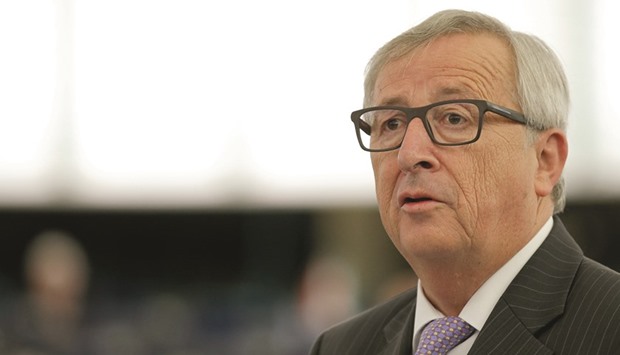Those leading the camp for Britain to exit the EU are now proving to be unpatriotic by jumping ship, European Commission President Jean-Claude Juncker said yesterday, pointing the finger at Boris Johnson and Nigel Farage.
Former London mayor Johnson and Farage, an EU lawmaker and leader of the UK Independence Party (Ukip), had both been key figures arguing for a so-called Brexit ahead of last month’s referendum, which was won by their camp.
However, Johnson decided last week not to run as successor to Prime Minister David Cameron, who tendered his resignation following the referendum.
Farage announced on Monday that he would step down as Ukip leader, although he plans to keep his seat in the European Parliament.
“The beaming Brexit heroes of yesterday are the tragic heroes of today,” Juncker said yesterday during a plenary session of the EU’s legislature in the French city of Strasbourg.
The likes of Johnson and Farage are “retro-nationalists and no patriots”, he added, noting: “Patriots do not leave the ship when the situation gets difficult, that’s when they stay.”
He said it was incomprehensible that the champions of Brexit now needed several months to agree on their approach.
Britain has said it will not launch formal exit negotiations until after Cameron’s successor has been chosen, with some contenders for the position saying this may not happen until next year.
“I don’t understand why the Brexit camp needs months before knowing what to do,” Juncker said. “I would have thought that they would have had a plan. Instead of developing a plan, they are leaving the boat.”
EU leaders have insisted that the bloc will not enter into exit negotiations with London until it has triggered Article 50 of the EU’s treaty, which launches a divorce process of at least two years.
Meanwhile, a debate has begun within the bloc’s remaining 27 member states over the future of the EU, in light of growing euroscepticism across the continent.
“Too many people in Europe are unhappy with the current state of affairs – be it on the national or European level – and expect us to do better,” EU President Donald Tusk told the bloc’s legislature.
Some argue that the bloc must respond by seeking more alignment among member states, but Dutch Prime Minister Mark Rutte cautioned against the approach.
His country, which is also home to a strong eurosceptic movement, held the EU’s rotating presidency for the last six months.
“It would be wrong to rush blindly forward towards more political integration, and a more federal Europe because that ... would be a denial of the sentiment felt by many European people, to whom the EU is, or has become, something remote and aloof,” Rutte said.

Juncker: The beaming Brexit heroes of yesterday are the tragic heroes of today.
